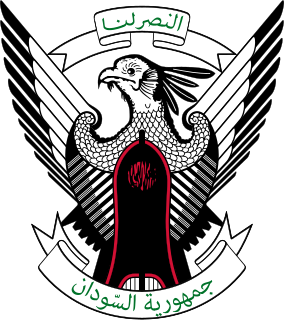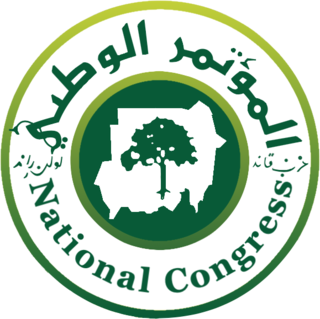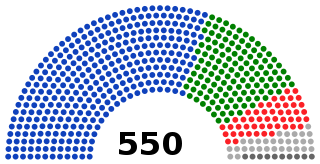
Currently, the politics of Sudan takes place in the framework of a federal provisional government. Previously, a president was head of state, head of government, and commander-in-chief of the Sudanese Armed Forces in a de jure multi-party system. Legislative power was officially vested in both the government and in the two chambers, the National Assembly (lower) and the Council of States (higher), of the bicameral National Legislature. The judiciary is independent and obtained by the Constitutional Court. However, following a deadly civil war and the still ongoing genocide in Darfur, Sudan was widely recognized as a totalitarian state where all effective political power was held by President Omar al-Bashir and his National Congress Party (NCP). However, al-Bashir and the NCP were ousted in a military coup which occurred on April 11, 2019. The government of Sudan was then led by the Transitional Military Council or TMC. On 20 August 2019, the TMC dissolved giving its authority over to the Sovereignty Council of Sudan, who were planned to govern for 39 months until 2022, in the process of transitioning to democracy. However, the Sovereignty Council and the Sudanese government were dissolved in October 2021.

The National Congress Party was a major political party that dominated domestic politics in Sudan from its foundation until the Sudanese Revolution.

Salva Kiir Mayardit, also known as Salva Kiir, is a South Sudanese politician who has been President of South Sudan since its independence on July 9, 2011. Prior to independence, he was President of the Government of Southern Sudan, as well as First Vice President of Sudan, from 2005 to 2011. He was named Commander-in-Chief of the Sudan People's Liberation Army (SPLA) in 2005, following the death of John Garang.

This article covers the period of the history of Sudan between 1985 and 2019 when then Sudanese Defense Minister Abdel Rahman Swar al-Dahab seized power from Sudanese President Jaafar Nimeiry in the 1985 Sudanese coup d'état. Not long after, Field Marshal Omar al-Bashir, backed by an Islamist political party, the National Islamic Front, overthrew the short lived government in a coup in 1989 where he ruled as President until his fall in April 2019. During Bashir's rule, also referred to as Bashirist Sudan, he was re-elected three times while overseeing the independence of South Sudan in 2011. His regime was criticized for human rights abuses, atrocities and genocide in Darfur and allegations of harboring and supporting terrorist groups in the region while being subjected to United Nations sanctions beginning in 1995, resulting in Sudan's isolation as an international pariah.

The Council of States is the currently-dissolved upper house of the parliament of Sudan. It was formed in 2005 as part of the Comprehensive Peace Agreement (CPA) which establishment of bicameral National Legislature. The members are indirectly elected by state legislatures and serve five-year terms.

The National Assembly is the lower house of the National Legislature of Sudan. The Legislature was unicameral until 2005. The upper house is the Council of States.

Government of Sudan is the federal provisional government created by the constitution of Sudan having the executive, parliament, and the judiciary. Previously, a president was head of state, head of government, and commander-in-chief of the Sudanese Armed Forces in a de jure multi-party system. Legislative power was officially vested in both the government and in the two chambers, the National Assembly (lower) and the Council of States (higher), of the bicameral National Legislature. The judiciary is independent and obtained by the Constitutional Court. However, following a deadly civil war and the still ongoing genocide in Darfur, Sudan was widely recognized as a totalitarian state where all effective political power was held by President Omar al-Bashir and his National Congress Party (NCP). However, al-Bashir and the NCP were ousted in a military coup which occurred on April 11, 2019. The government of Sudan was then led by the Transitional Military Council or TMC. On 20 August 2019, the TMC dissolved giving its authority over to the Sovereignty Council of Sudan, who were planned to govern for 39 months until 2022, in the process of transitioning to democracy. However, the Sovereignty Council and the Sudanese government were dissolved in October 2021.

The politics of South Sudan concerns the system of government in the Republic of South Sudan, a country in East Africa, and the people, organizations, and events involved in it.
Peter Lam Both has been the Governor of Latjoor, South Sudan since 24 December 2015. He is the first governor of the state, which was created by President Salva Kiir on 2 October 2015.

The temporary de factoConstitution of Sudan is the Draft Constitutional Declaration, which was signed by representatives of the Transitional Military Council and the Forces of Freedom and Change alliance on 4 August 2019. This replaced the Interim National Constitution of the Republic of Sudan, 2005 (INC) adopted on 6 July 2005, which had been suspended on 11 April 2019 by Lt. Gen Ahmed Awad Ibn Auf in the 2019 Sudanese coup d'état.

The States of South Sudan were created out of the three historic former provinces of Bahr el Ghazal (northwest), Equatoria (southern), and Greater Upper Nile (northeast). The states are further divided into 79 counties.

South Sudan, officially known as the Republic of South Sudan, is a landlocked country in Central Africa. It is bordered by Ethiopia, Sudan, Central African Republic, Democratic Republic of the Congo, Uganda and Kenya. Its population was estimated as 12,778,250 in 2019. Juba is the capital and largest city. The nation is sometimes informally referred to as the Nilotic Republic.

The Constitution of Southern Sudan was the 2005 Interim Constitution of Southern Sudan, as established by the Government of Sudan and the Sudan People's Liberation Army/Movement within the framework of the Comprehensive Peace Agreement ending the Second Sudanese Civil War, signed into practice on 9 January 2005.

The Transitional National Legislature of South Sudan is the legislature of South Sudan. The Transitional National Legislature consists of the Transitional Council of States and the Transitional National Legislative Assembly.

The Transitional National Legislative Assembly is the lower house of the Transitional National Legislature of South Sudan.

James Wani Igga is a South Sudanese serving as the 2nd Vice President of South Sudan. He was Speaker of the National Legislative Assembly from 2011 to 2013 and Secretary General of the Sudan People's Liberation Movement. On 30 May 2020, he tested positive for COVID-19.

South Sudanese nationality law is regulated by the Constitution of South Sudan, as amended; the South Sudanese Nationality Act and Nationality Regulations, and their revisions; and various international agreements to which the country is a signatory. These laws determine who is, or is eligible to be, a national of South Sudan. The legal means to acquire nationality, formal legal membership in a nation, differ from the domestic relationship of rights and obligations between a national and the nation, known as citizenship. Nationality describes the relationship of an individual to the state under international law, whereas citizenship is the domestic relationship of an individual within the nation. In South Sudan, nationality is often equated with ethnicity, despite recognition of the legal definitions. South Sudanese nationality is typically obtained under the principle of jus soli, i.e. by birth in South Sudan, or jus sanguinis, born to parents with South Sudanese ancestry. It can be granted to persons with an affiliation to the country, or to a permanent resident who has lived in the country for a given period of time through naturalization.

The 2019–2024 Sudanese transition to democracy is an ongoing democratic transition in Sudan that began in July 2019.
The Sudanese peace process consists of meetings, written agreements and actions that aim to resolve the War in Darfur, the Sudanese conflict in South Kordofan and Blue Nile, and armed conflicts in central, northern and eastern Sudan.

Wani Michael is a South Sudanese Advocate and an Activist who is also the Founder and Former Chief Executive Officer of Okay Africa Foundation, a youth-led Non-Governmental Organization formed in 2016 in South Sudan.














